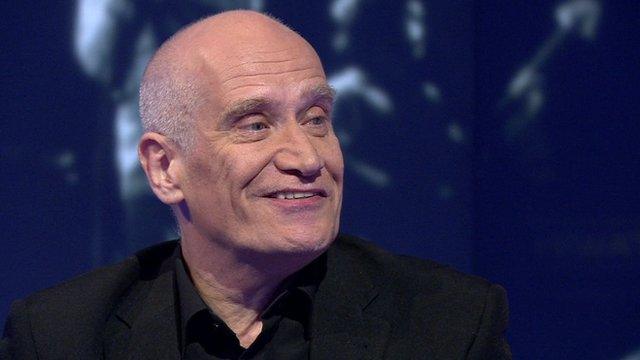Wilko Johnson film 'not just for rock'n'roll fans'
- Published
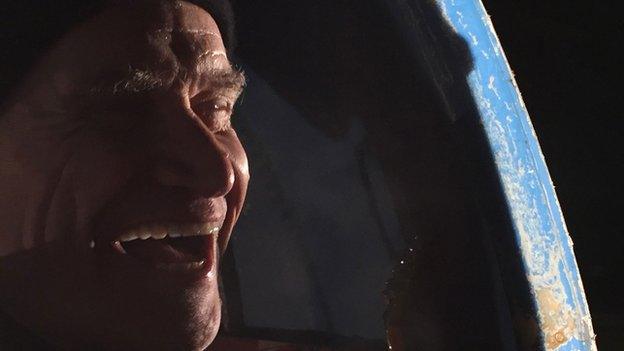
The Ecstasy Of Wilko Johnson had its world premiere at the SXSW festival in Austin, Texas, in March
What do you do if you set out to make an intimate documentary about a terminally ill rock performer - only to discover your central character then makes an astonishing return to health?
In the case of Julien Temple, you rejoice. Not only was the film-maker delighted to see Wilko Johnson defy death, he also thinks he ended up with a better film. And it's not just for fans of rock'n'roll, he says.
In late 2013, Temple was approached to work with Johnson. The guitarist had already appeared in Oil City Confidential, Temple's 2009 film featuring 1970s R&B band Dr Feelgood and their home territory of Canvey Island in Essex.
"But this time it looked like quite a small project," Temple says. "Wilko was making an album with [The Who's] Roger Daltrey on a very quick turnaround, and they needed a video. But Wilko is an engaging man, and I thought I would at least film a couple of conversations with him. Because by then he certainly had a story to tell."
The outline of that story is now well known. The guitarist had largely slipped from the headlines until, in early 2013, he gave a candid interview to BBC Radio 4's Front Row programme, explaining he had been diagnosed with pancreatic cancer and been told he had about 10 months to live.
In the interview, Johnson, now 67, was resolute and humorous. He impressed listeners with his determination to make the best of whatever time was left to him.
Which, as Temple's film records, has turned out to be considerably longer than doctors expected.
This week, The Ecstasy of Wilko Johnson received its UK premiere, in London, in aid of the Teenage Cancer Trust charity. Afterwards, Johnson played a celebratory set at the 100 Club on Oxford Street.
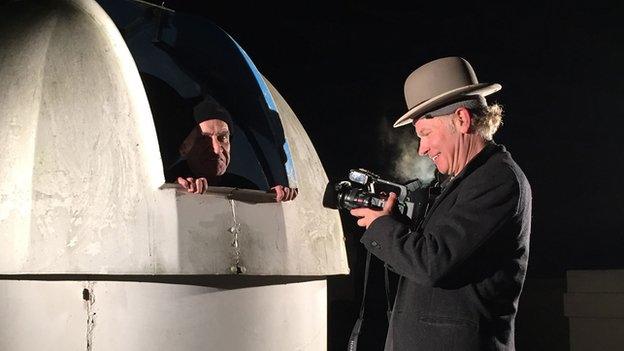
Temple's film credits include The Filth and the Fury, The Future Is Unwritten - Joe Strummer and Oil City Confidential
Aptly, photographs were being taken by surgeon Charlie Chan. Chan works in Cheltenham and specialises in breast surgery, but his other passion is photography. The combination has had an extraordinary effect on Johnson's life and may even have saved it.
Chan says he was taken aback when he went to photograph the guitarist at the London venue Koko in October 2013. "I'd already photographed Wilko at home in Southend that summer - which I was certain would be the last time I would ever see him," he says. "Yet he actually looked better at the club than he had three months before.
"I'm not a specialist in pancreatic cancers, but the penny dropped. Something just didn't add up: by then he should have been very sick indeed or probably dead. So I arranged for Wilko to see the surgeon Emmanuel Huguet at Addenbrooke's hospital in Cambridge. After that things moved very quickly."
Julien Temple did not set out to make a standard hospital documentary, but the parts of The Ecstasy that record Wilko Johnson's medical journey are gripping and at times moving.
Yet the director says he hopes audiences will be equally engaged by the sight of Johnson by the River Thames in Essex, playing chess with the sinister figure of Death.
At the time, no-one expected Johnson could possibly take the game.
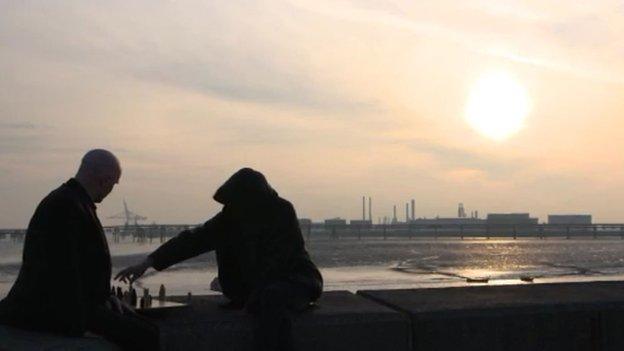
The chess scene from The Ecstasy of Wilko Johnson
The chess is an obvious nod to Ingmar Bergman's film The Seventh Seal. It is not the only movie classic Temple borrows from.
"These days a documentary like this is made with a crew of four or five, but modern kit can serve the film-maker incredibly well," he says. "We could retain the intimacy which was important to let Wilko speak openly. But we also weave in several dramatic clips from Powell and Pressburger's classic film A Matter of Life and Death from 1946."
In the film, David Niven plays a wartime RAF pilot who cheats death: Temple says the parallel seemed irresistible. Johnson grins and says it is one of his favourite films too.
The documentary is not all about death or defeating death. We also learn why Johnson loves astronomy and Canvey Island so much. The soundtrack features everything from 1950s rock'n'roll to Ralph Vaughan Williams.
Johnson says the time under a sentence of death now feels like a dream he is in the process of shaking off. "I've been told that Julien captures that well, but the truth is so far I've avoided seeing the complete film: I find it toe-curling to watch myself on screen or to read pieces about my life," he says.
"Who knows what the future will bring, but Charlie Chan and then the NHS at Addenbrooke's gave me a new lease of life. It was hard originally to get my head around the terrible diagnosis two and a half years ago. But in a way to be told by Mr Huguet in Cambridge that my cancer was operable after all was even more difficult to take in. I've been incredibly lucky."
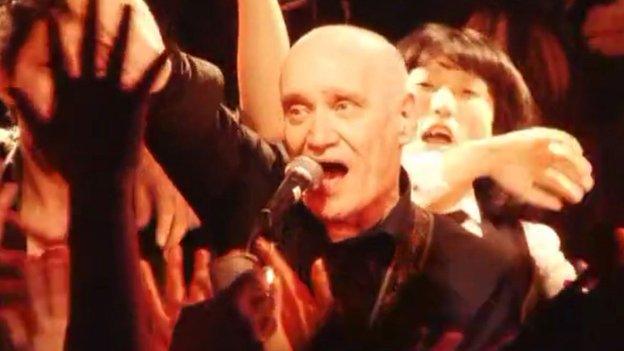
Johnson was given 10 months to live after being diagnosed with pancreatic cancer
Temple says no project he has ever worked on has changed so much so quickly. "It was about two months between my coming on board and then suddenly Wilko getting his amazing news," her says. "My mum was dying at the time that Wilko was so ill, and all the emotions began to merge. I actually found what Wilko said, both on screen and off, very inspiring.
"I love the music in the film, seeing Wilko perform now and 40 years ago. But the film is not just for fans of rock'n'roll. All of us are going to face something like he faced - either ourselves or in a parent or a partner or a friend.
"Both of us are atheists, but I think there's an unexpected element of spirituality to the film. That is as well as the rock'n'roll of course."
The Ecstasy of Wilko Johnson is in selected cinemas from 17 July
- Published8 December 2014
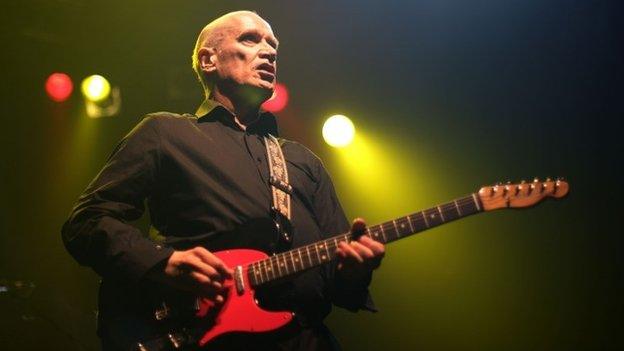
- Published22 October 2014
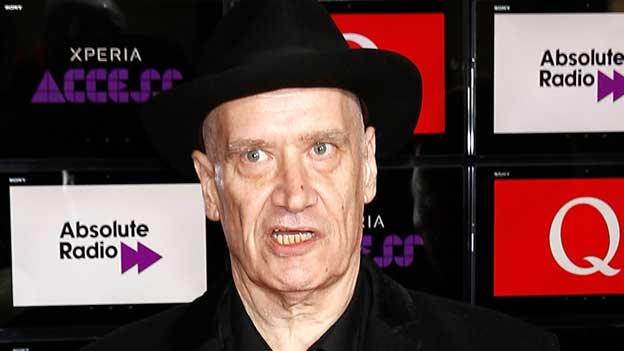
- Published30 April 2014
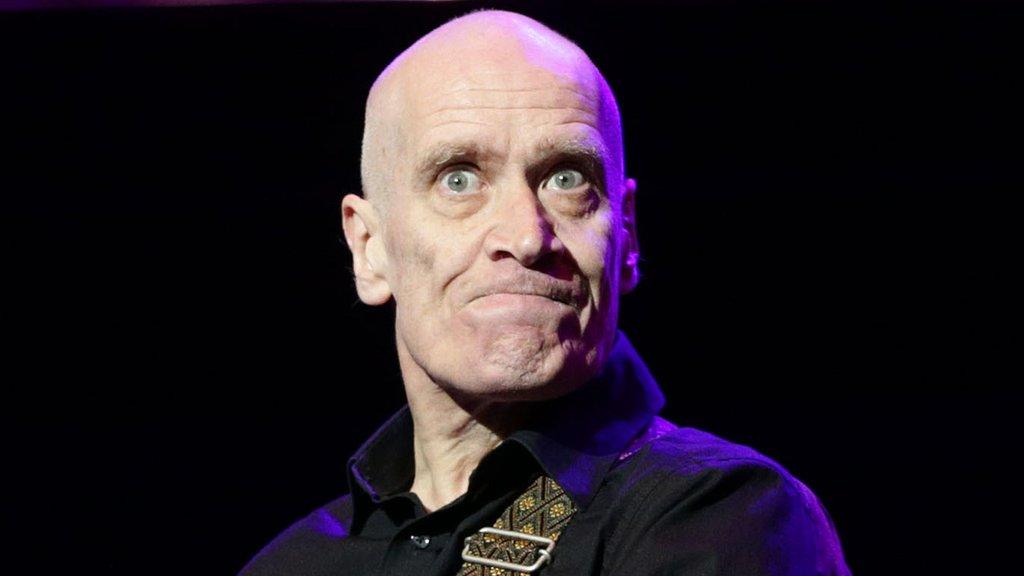
- Published7 August 2013
